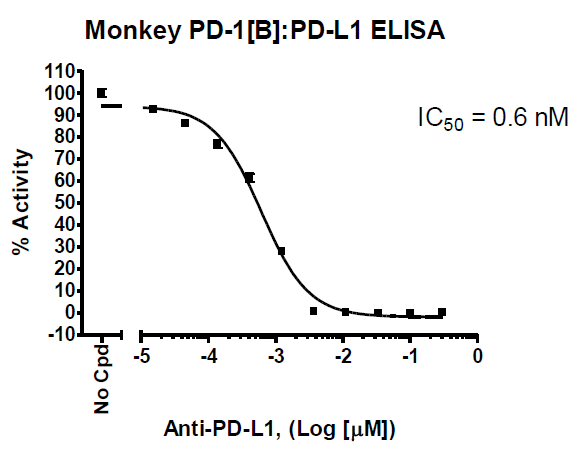Monkey PD-1[Biotinylated]:PD-L1 Inhibitor Screening Assay Kit
The Monkey PD1[Biotinylated]: PD-L1 Inhibitor Screening Assay Kit is a chemiluminescence assay designed for screening and profiling molecules that block the binding of PD-1 (programmed cell death protein 1) to PD-L1 (programmed cell death 1 ligand 1). This assay kit comes in a convenient 96-well format, with enough purified monkey biotin-labeled PD-1 (amino acids 25-167), monkey PD-L1 (amino acids 25-167), assay buffers and detection reagents for 100 enzyme reactions.
The key to this kit is the high affinity of biotin-labeled PD-1 for streptavidin-HRP. First, a 96-well plate is coated with PD-L1, followed by incubation with PD-1. Finally, the plate is treated with streptavidin-HRP followed by addition of HRP substrate. The chemiluminescence signal can be detected with a microplate reader capable of reading chemiluminescence. The signal generated is proportional to the binding between PD-1 and PD-L1.
- 1x PBS (Phosphate Buffer Saline) Buffer
- Microplate reader capable of reading chemiluminescence
- Adjustable micropipettor and sterile tips
- Orbital Shaker
| Catalog # | Name | Amount | Storage |
| 71153 | PD-L1 (Monkey), Fc fusion (Human IgG1)* | 10 µg | -80°C |
| 71235 | PD-1 (Monkey), Fc fusion (Human IgG1), Biotin-Labeled * | 5 µg | -80°C |
| 79311 | 3x Immuno Buffer 1 | 50 ml | -20°C |
| 79728 | Blocking Buffer 2 | 50 ml | +4°C |
| 79742 | Streptavidin-HRP | 10 µl | +4°C |
| 79670 | ELISA ECL Substrate A (translucent bottle) | 6 ml | Room Temp |
| ELISA ECL Substrate B (brown bottle) | 6 ml | Room Temp | |
| 79699 | 96-well white plate | 1 | Room Temp |
*The concentration of the protein is lot-specific and will be indicated on the tube.
PD-L1 and PD-L2 binding to PD-1, a receptor expressed on T-cells, negatively regulates immune responses. PD-1 ligands PD-L1 and PD-L2 are found on the surface of many cancer cells, and their interaction with receptor PD-1 inhibits T cell activity and allows cancer cells to escape immune surveillance. This pathway is also involved in regulating autoimmune responses. Therefore, these proteins (termed immune checkpoints) are promising therapeutic targets for many types of cancer as well as multiple sclerosis, arthritis, lupus, and type I diabetes. Checkpoint inhibitors have remarkable efficacy in a wide range of cancer types and have revolutionized cancer treatment. PD-1 inhibitors nivolumab, pembrolizumab, cemiplimab and PD-L1 inhibitors atezolizumab, avelumab, and durvalumab are all FDA-approved drugs for immuno-therapy.
Onlamoon, N. et al. Immunol. 2008, 124.1: 277-293
Wang. C. et al. Cancer Immunol. Res. 2014, 2.9: 846-856
Sasca D, et al. 2019 Blood 133: 2305-2319


